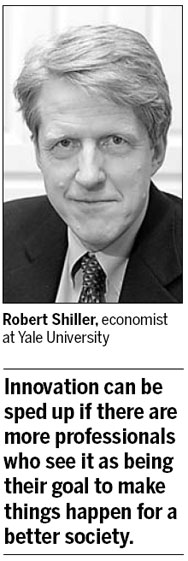Achievement of development goals hinges on effective capital allocation
Urbanization is expected to be a driving force in China's long-term economic growth, and ensuring that happens will require a good allocation of capital, financial innovation and efforts to reduce inequality, says Robert Shiller, a Yale University economist.
China aims to build 36 million affordable apartments for low-income residents, 45,000 km of high-speed railways and 83,000 km of highways between 2011 and 2015.
"Achieving these goals requires the careful and correct allocation of capital," Shiller said.
Thomson Reuters has deemed Shiller a contender for the 2012 Nobel Prize in Economics for his pioneering contributions to the understanding of "financial market volatility and the dynamics of asset prices".
Economic growth in China will require a further expansion of the financial industry, leading to the involvement - either direct or indirect - of many more people in that industry, he said.

Shiller also said China needs to have more financial advisers. The country has about one lawyer for every 8,000 people, whereas the US is home to one for every 300 people.
When more lawyers and financial professionals work in China, corruption and other problems will become rarer, he said.
Shiller called on China to innovate its financial thinking, saying no country should simply borrow unmodified financial ideas from the rest of the world.
That's especially true for China, which has a unique institutional heritage and culture, and has been undergoing rapid change, Shiller wrote in the preface of the Chinese version of his new book, Finance and the Good Society.
Every country has its own set of economic conditions that it must work within.
"If people in the US suddenly saved 25 percent of their income, that would destroy the US economy. The economy would fall into a depression," he said.
Innovations are inherently slow to bring about, both because financial and legal institutions are complex and because many people tend to resist them.
"But the promotion of such innovation can be sped up if there are more professionals who see it as being their goal to make things happen for a better society," he said.
China's top economic planning body, the National Development and Reform Commission, is expected to launch a long-waited national income distribution plan in 2013.
Shiller said a long-term plan for dealing with inequality will take 20 to 30 years and that no country should allow itself to become complacent about the risks of increasing inequality.
Large fortunes have been amassed in China in recent years. A list of the richest people in China contains the names of 115 billionaires, according to a ranking compiled by Forbes Magazine. Only the United States is home to more.
The world is quickly becoming more interconnected, and information technology is rapidly becoming more advanced, he said.
Computers and improved robotics are also doing many jobs once performed by people, Shiller said.
"Couple those changes with the rapid economic changes as China grows, and one faces a highly uncertain future for economic inequality," said Shiller.
The good news for information technology is that it can also make information about property and other subjects more accessible, thus helping to eliminate one of the biggest hurdles blocking China's efforts to reduce income inequality.
A path toward that goal needs to be established. The US introduced its first personal income tax in 1861, but then abandoned it a few years later after finding it difficult to collect amid rampant cheating. The tax was resumed in the 1930s, a time when it was easier to ascertain how much each taxpayer should owe.
Shiller said the rich in China should be encouraged to be more philanthropic.
The Chinese are often thought to show more generosity toward their families and communities rather than toward broader groups of people.
"The newly wealthy in China, just as in any other country, should be thinking of a broader vision of how they can contribute toward a better society," he said.
Contact the writer at lanlan@chinadaily.com.cn
